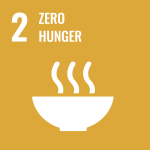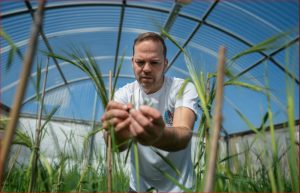 Goal 2: Zero Hunger
Goal 2: Zero Hunger
END HUNGER, ACHIEVE FOOD SECURITY AND IMPROVED NUTRITION AND PROMOTE SUSTAINABLE AGRICULTURE
Research
 Prof. Asaf Distelfeld and Prof. Tzion Fahima from the Department of Evolutionary and Environmental Biology, Faculty of Natural Sciences, lead the Institute of Evolution’s expanding Wild Cereal Gene Bank, which provides a gene pool of thousands of wild wheat samples. The Institute’s scientists played a key role in an international project that successfully sequenced the complex emmer wheat genome – a landmark achievement which will help develop a more productive, resource-efficient variety of the crop. The BARD Foundation invested $1.2 M in the Power Wheat Project, whose NPV they estimate to be $118 M.
Prof. Asaf Distelfeld and Prof. Tzion Fahima from the Department of Evolutionary and Environmental Biology, Faculty of Natural Sciences, lead the Institute of Evolution’s expanding Wild Cereal Gene Bank, which provides a gene pool of thousands of wild wheat samples. The Institute’s scientists played a key role in an international project that successfully sequenced the complex emmer wheat genome – a landmark achievement which will help develop a more productive, resource-efficient variety of the crop. The BARD Foundation invested $1.2 M in the Power Wheat Project, whose NPV they estimate to be $118 M.
Researchers continue to find and isolate useful wild cereal genes lost over the past 10,000 years, which can improve drought and disease resistance, protein content and adaptability to varied soils and rainfall levels. Evolutionary biologists at the Faculty of Natural Sciences are cultivating fava beans as the next generation of superfoods. Fava beans provide superior nutritional value and are a healthier alternative to animal protein. The team is developing new genomic tools for optimal fava bean breeding.
As land-based agriculture suffers from the effects of climate change and water shortages, the Leon H. Charney School of Marine Sciences explores the flora and fauna of the oceans as food sources. Researchers are seeking novel protein sources from seaweed and sustainable fish and shellfish production that willaddress these growing needs.
Public Engagement
In the State of Israel, 220,000 older people with functional disabilities rely on paid caregivers assistance on a daily basis. Caregivers help the elderly perform basic tasks including food preparation and monitoring medication intake. During COVID-19, public transportation was reduced to 25%, thus preventing many caregivers from continuing their work. Prof. Anna Zisberg, of the Faculty of Social Welfare and Health Sciences, began a campaign to recruit volunteers to drive caregivers to the elderly’s homes so that they would continue to receive much needed support. Similar initiatives followed suit across the country.
Dr. Tamar Krugman, Curator of the Wild Cereals Gene Bank and a researcher at the Institute of Evolution, sent 350 different types of wild wheat seeds collected from 74 areas around the country to the Svalbard Global Seed Vault. Funded by the Norwegian government, the Vault provides security of the world’s food supply against the loss of seeds in gene banks due to mismanagement, accident, equipment failures, funding cuts, and natural disasters.
Learning & Students
The Faculty of Social Welfare and Health Sciences offers a course in Nutritional Policy and Present Dilemmas taught by Prof. Ronit Endevelt. In this course, students explore how nutritional policy can advance or degrade society’s health and well-being.
Dr. Shai Gar, a PhD candidate in the Department of Asian Studies, is studying the mass starvation in North Korea in the late nineties that led the country’s leadership to diverge from isolationism and request international assistance for the first time. Gar examines the intricacies of disaster diplomacy with reference to this classic example.
Operations
The University of Haifa launched a Solidarity Fund for thousands of staff and students who lost their jobs or family income due to the COVID-19 pandemic.
The Shamir Research Institute in the Golan Heights operates Molecular labs; plant breeding rooms; Microscopic tools – genetic and microbiological; and an advanced greenhouse for Agro-Innovation research. Through high-quality professional services using cutting-edge science and technology, we support the Golan’s farmers and ranchers.

